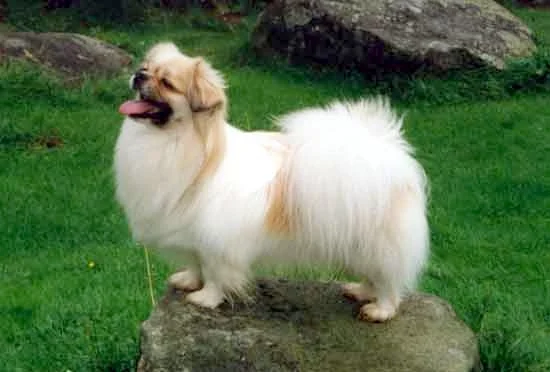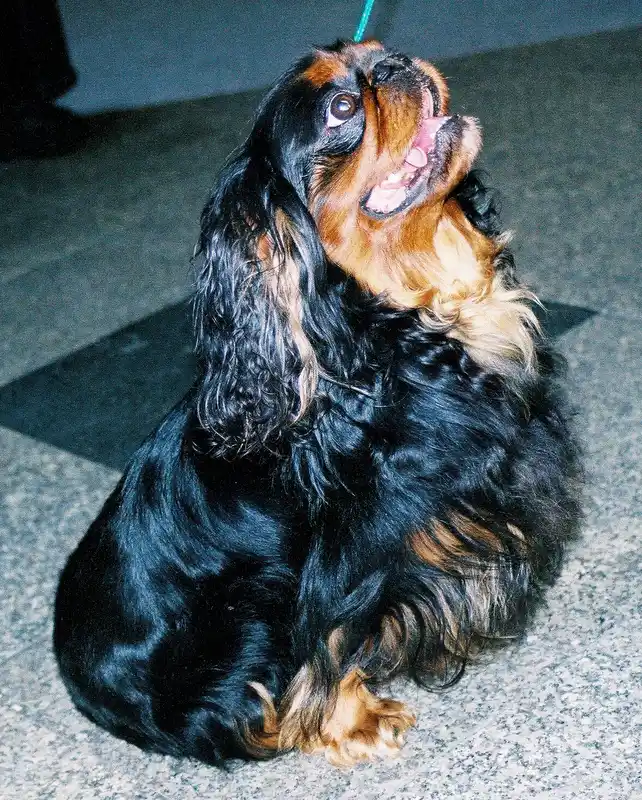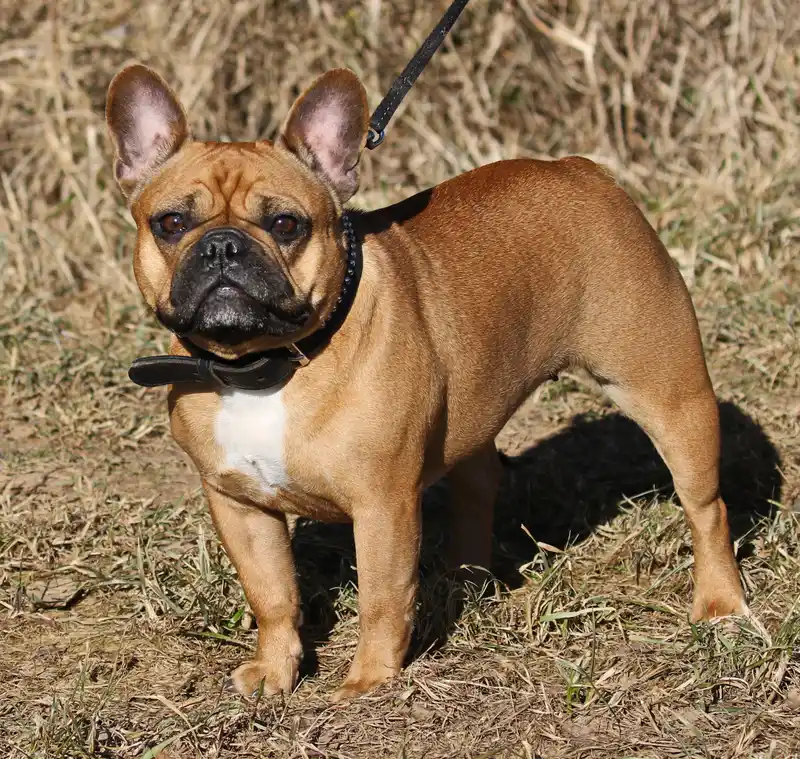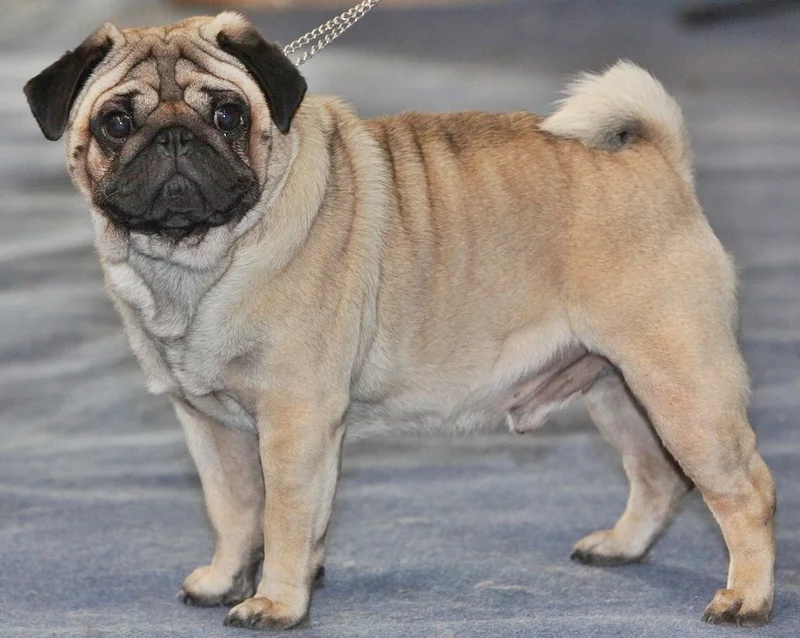Boston Terrier
Also known as: American Gentleman
The Boston Terrier, known as the 'American Gentleman,' is a compact, intelligent breed with a friendly disposition. They thrive on human interaction and make excellent companions for families and individuals.
⚡At a glance
🏆Best traits
Key Facts
- Height
- 38-43 cm
- Weight
- 4.5-11.3 kg
- Life Span
- 10 - 14 years
- Group
- Non-Sporting
- Origin
- United States
- Shedding
- Low
- Exercise
- 30 min/day
- Best For
- Apartments, Families, First-Time Owners
Overview
🐕Breed Overview
✨Key Traits
💡What Makes Boston Terrier Special
Boston Terriers are compact and well-proportioned, with a distinctive tuxedo-like coat that features white markings on a black, brindle, or seal background. Their short, smooth coat requires minimal grooming, and they are known for their expressive faces and large, round eyes.
This breed is highly intelligent and eager to please, making them relatively easy to train, although they can exhibit stubbornness. Their friendly demeanor and playful spirit make them excellent companions for families, and they are known for their loyalty and affection towards their owners.
Boston Terriers are also adaptable, thriving in both urban and suburban environments, as long as they receive regular exercise and social interaction.
The Boston Terrier, affectionately known as the 'American Gentleman,' is a charming and intelligent breed that has captured the hearts of dog lovers across the globe. Originating in Boston, Massachusetts, this compact and well-proportioned dog was developed in the late 19th century through the interbreeding of English Bulldogs and White English Terriers. Initially bred for fighting, the Boston Terrier has evolved into a beloved companion known for its friendly demeanor and playful spirit.
With a distinctive tuxedo-like coat, typically black, brindle, or seal with white markings, the Boston Terrier is easily recognizable and often described as dapper. Their short, smooth coat requires minimal grooming, making them an ideal choice for busy families. Boston Terriers are known for their lively and affectionate personalities.
They are intelligent and eager to please, making them relatively easy to train, although they can be stubborn at times. Their friendly nature allows them to get along well with children, other dogs, and even non-canine pets, provided they are properly socialized from a young age. While they are generally quiet dogs, they will bark to alert their owners of any unusual activity, making them effective watchdogs.
Despite their small size, Boston Terriers are active dogs that require daily exercise to stay healthy and happy. They enjoy short walks, playtime in the yard, and interactive games that stimulate their minds. Their adaptability makes them suitable for apartment living, but they thrive on human interaction and should not be left alone for extended periods.
Health-wise, Boston Terriers are prone to certain conditions, including cataracts, patellar luxation, and respiratory issues due to their brachycephalic structure. Regular veterinary check-ups and a healthy diet are essential to ensure their well-being. With an average lifespan of 10 to 14 years, Boston Terriers can be loyal companions for many years, bringing joy and laughter to their families.
In summary, the Boston Terrier is a delightful breed that embodies the spirit of companionship and loyalty. Their charming personality, intelligence, and adaptability make them an excellent choice for families and individuals alike. Whether as a playful companion for children or a calm presence for adults, Boston Terriers have a unique ability to fit seamlessly into any home.
🎉Fun Facts
Boston Terriers are often referred to as 'American Gentlemen' due to their tuxedo-like markings and charming demeanor.
Boston Terriers have been popular companions since the early 1900s and have consistently ranked among the top breeds in the United States.
They are known for their unique vocalizations, including snorts and grunts, which can be quite entertaining.
They are often used as therapy dogs due to their gentle nature and ability to connect with people.
Breed Characteristics
Family & Friends
Good Behavior
Get Up & Go
Household Harmony
Temperament & Personality
✨Key Traits
🐕Core Temperament
The Boston Terrier is a friendly and lively breed known for its excellent disposition and high intelligence. They are devoted to their owners and sensitive to their moods, making them great companions.
While they are generally well-mannered indoors, they can be playful and energetic, enjoying games and outdoor activities. They may be reserved with strangers and can exhibit territorial behavior towards other pets, so early socialization is important.
Overall, Boston Terriers are affectionate, intelligent, and adaptable dogs that thrive on human interaction.
💫Personality Profile
Boston Terriers are known for their friendly and lively personalities. They are affectionate and enjoy being around people, making them excellent companions for families and individuals alike.
Their intelligence allows them to learn quickly, but they can be somewhat stubborn, requiring patience during training. They are generally good with children and other pets, especially when socialized from a young age.
While they may bark occasionally, they are not excessive barkers, making them suitable for apartment living. Their playful nature means they enjoy games and interactive activities, and they thrive on human interaction.
🔊Vocal Tendencies
Boston Terriers are generally quiet dogs, barking only when necessary. They may vocalize through snorts, grunts, and occasional barks, especially when excited or alerting their owners to something unusual.
Their vocalizations are typically not excessive, making them suitable for apartment living. However, early training is essential to ensure they do not develop excessive barking habits.
Their unique vocalizations can be quite endearing and add to their charm as companions.
Affection & Social Traits
Warm and balanced socially — here’s how it shows up day to day.
Energy & Activity
Calmer, low-energy vibe — great for matching your routine.
Communication Style
Generally quiet — a quick read on noise at home.
Care Requirements
🏃♂️Exercise Requirements
Daily Exercise
Boston Terriers are moderately active dogs that require regular exercise to maintain their health and happiness. Ideally, they should engage in at least 30 minutes of exercise each day, which can be broken down into shorter sessions throughout the day. Activities such as brisk walks, playtime in the yard, or interactive games like fetch are excellent for keeping them physically stimulated.
Given their compact size, they do not require extensive space, making them suitable for apartment living as long as they receive daily walks and playtime. Puppies may have higher energy levels and require more frequent play sessions, while senior dogs may need gentler activities to accommodate their reduced stamina. Regular exercise not only helps manage their weight but also contributes to their overall mental well-being, reducing the likelihood of behavioral issues stemming from boredom or pent-up energy.
Insufficient exercise can lead to weight gain, anxiety, and destructive behaviors, so it is crucial for owners to prioritize their Boston Terrier's activity needs.
Preferred Activities
🏠Living & Adaptability
Space Requirements
Boston Terriers are adaptable dogs that can thrive in various living environments, including apartments and houses with small yards. They do not require extensive outdoor space, but they benefit from having a secure area to play and explore.
Owners living in smaller spaces should ensure their Boston Terrier receives daily walks and playtime to meet their exercise needs. The breed's compact size and low exercise requirements make them suitable for urban living, but they should not be left alone for long periods, as they thrive on human interaction.
Lack of space or confinement can lead to anxiety and destructive behavior, so providing mental stimulation and regular socialization is essential.
Climate Preference
🍲Feeding Guide
Schedule
Food Types
Portion Size
Special Nutritional Needs
Boston Terriers may have sensitive digestive systems, so it's important to choose a high-quality diet that suits their needs. Some may be prone to food allergies, so monitoring their reactions to new foods is essential. Regular feeding schedules and portion control are crucial to prevent obesity, which can exacerbate health issues.
✨Grooming Requirements
Grooming Overview
Boston Terriers have a short, smooth coat that requires minimal grooming. A weekly brushing is sufficient to remove dead hair and keep their coat shiny.
Bathing should be done as needed, typically every few months or when they get particularly dirty. Regularly check their ears for wax buildup and clean them gently with a vet-recommended solution.
Their eyes may require occasional wiping to remove any discharge, and daily eye drops can help keep them clean. Nail trimming should be done every few weeks to prevent overgrowth.
Care Schedule
Brush weekly, bathe as needed (every few months), trim nails every 2-4 weeks.
Health Profile
⚕️Health Care
Regular veterinary care is crucial for maintaining the health and lifespan of Boston Terriers. Routine check-ups, vaccinations, and preventive care can help detect and address health issues early.
Owners should also be vigilant about their dog's weight, as obesity can lead to various health problems. A balanced diet, regular exercise, and prompt attention to any health concerns are essential for promoting a long and healthy life.
Health Issues Overview
⏳Average Lifespan
Genetic Factors
Genetics play a significant role in the lifespan of Boston Terriers. Certain hereditary health issues, such as cataracts and patellar luxation, can affect their overall health and longevity.
Responsible breeding practices that prioritize genetic diversity and health screening can help mitigate these risks. Potential owners should seek reputable breeders who conduct health tests on their breeding stock to ensure the best possible outcomes for their puppies.
Living Conditions
Boston Terriers thrive in environments that provide moderate temperatures and avoid extreme heat or cold due to their brachycephalic nature. A comfortable indoor setting with access to outdoor space for play and exercise is ideal.
Regular interaction with family members and mental stimulation through play and training can enhance their quality of life and longevity. Exposure to harsh weather conditions can negatively impact their health, so owners should ensure they are kept in a climate-controlled environment.
🏥Common Health Issues
Cataracts
Warning Signs
🔬Diagnosis
Veterinary eye examination
💊Treatment
Surgery may be required to remove cataracts.
📝Management Tips
Regular eye check-ups, prompt treatment of symptoms, and maintaining a healthy diet can help manage this condition.
Patellar Luxation
Warning Signs
🔬Diagnosis
Physical examination and X-rays
💊Treatment
Surgical correction may be needed for severe cases.
📝Management Tips
Weight management, physical therapy, and in severe cases, surgical intervention may be necessary.
Deafness
Warning Signs
🔬Diagnosis
Veterinary hearing tests
💊Treatment
No treatment; management through training.
📝Management Tips
Early detection is key; training with visual cues can help manage this condition.
Allergies
Warning Signs
🔬Diagnosis
Allergy testing and elimination diets
💊Treatment
Medications and topical treatments may be required.
📝Management Tips
Identify and avoid allergens, use antihistamines or prescribed medications as needed.
🛡️Preventive Care
🔬Hip Evaluation
Hip Evaluation assesses the hip joints for dysplasia and other abnormalities, which can affect mobility and quality of life.
📅 Annually, especially for breeding dogs.
🔬Eye Examination
Eye Examination checks for common eye conditions such as cataracts and retinal issues, which are prevalent in the breed.
📅 Every 1-2 years, or as recommended by a veterinarian.
🔬Hearing Test
Hearing Test evaluates the dog's hearing ability, as deafness can be a concern in Boston Terriers.
📅 As needed, especially if symptoms are observed.
Training
🧠Intelligence & Trainability
💪Work Drive
Boston Terriers thrive on mental stimulation and enjoy tasks that challenge their intelligence. Activities such as agility training, obedience classes, and interactive puzzle toys can keep them engaged and prevent boredom.
Their history as companion dogs means they are happiest when involved in family activities. Without sufficient mental and physical engagement, they may develop behavioral issues, so it's essential to provide them with opportunities to learn and play.
⚠️Training Considerations
Boston Terriers can exhibit stubbornness, which may pose challenges during training. They require consistent, positive reinforcement methods to encourage good behavior.
Some may also display territorial tendencies, leading to aggressive behavior toward unfamiliar dogs or strangers. Early socialization and exposure to various environments can help mitigate these issues.
Owners should be patient and persistent, using engaging training techniques to keep their Boston Terrier motivated and focused. Additionally, their sensitivity to harsh tones can hinder training progress, so a gentle approach is essential.
📝Training Tips
Training a Boston Terrier can be a rewarding experience, as they are intelligent and eager to please. Start with basic commands and gradually introduce more complex tasks.
Use positive reinforcement techniques, such as treats and praise, to encourage desired behaviors. Consistency is key; establish a routine for training sessions and ensure all family members use the same commands.
Incorporate play into training to keep the dog engaged and excited. Socialization is also crucial; expose your Boston Terrier to different people, pets, and environments to help them develop confidence and adaptability.
History & Heritage
📜Origin Story
The Boston Terrier's story begins in the 1860s when coachmen in Boston began interbreeding their employers' dogs. One notable cross was between an English Bulldog and a White English Terrier, resulting in a dog named Hooper's Judge.
This dog weighed over 30 pounds and was bred down in size to create a more compact companion. The breed gained popularity in Boston, leading to the formation of the American Bull Terrier Club in 1889, which later changed its name to the Boston Terrier Club.
By 1893, the breed was officially recognized by the American Kennel Club, marking its place in American canine history as a beloved companion.
⏳Development History
The Boston Terrier originated in the late 19th century in Boston, Massachusetts, as a result of breeding between the English Bulldog and the now-extinct White English Terrier. The breed's foundation dog, Hooper's Judge, was a significant influence, and his lineage contributed to the development of the Boston Terrier we know today.
Initially bred for fighting, the breed was later refined for companionship, leading to its acceptance by the American Kennel Club in 1893 as the first non-sporting breed in the United States. Over the years, the breed has evolved to prioritize temperament and appearance, with a focus on its distinctive markings and friendly nature.
🛡️Purpose & Historical Role
Originally bred for dog fighting and ratting, the Boston Terrier was later refined to serve as a companion dog. Its friendly demeanor and intelligence made it an ideal family pet, and it has since become a popular choice for therapy and service work. The breed's compact size and affectionate nature have solidified its role as a cherished member of many households.
🏺Cultural Significance
The Boston Terrier is often referred to as the 'American Gentleman' due to its dapper appearance and friendly disposition. This breed has become a symbol of American culture, representing the spirit of companionship and loyalty.
Its popularity has led to its recognition as a mascot for various institutions, including Boston University and Wofford College. The Boston Terrier's unique characteristics and charming personality have made it a beloved companion for families across the United States and beyond.
Conservation Status
The breed exists today and isn’t classified as extinct.
Often found in multiple regions; easier to encounter.
This breed is well-established with healthy population numbers.
?Frequently Asked Questions
Is the Boston Terrier good for apartment living?
Absolutely! The Boston Terrier is exceptionally well-suited for apartment living. Their adaptable temperament and manageable size make them an ideal choice for urban dwellers. They thrive in smaller spaces with regular walks and indoor enrichment.
How much does a Boston Terrier shed?
The Boston Terrier sheds minimally compared to many other breeds. While no dog is truly hypoallergenic, this breed produces less loose hair than average. Routine brushing will help manage the little shedding they do.
Are Boston Terriers easy to train?
The Boston Terrier can be moderate when it comes to training. They can learn commands and routines with consistent effort, though they may sometimes show a stubborn streak. Patience, positive reinforcement, and regular practice sessions will yield the best results.
How long do Boston Terriers live?
The average lifespan of a Boston Terrier is 10 - 14 years. Lifespan can be influenced by genetics, diet, exercise, and overall health care. Regular veterinary check-ups and a healthy lifestyle can help your Boston Terrier live a long and happy life.
Is the Boston Terrier good with kids?
Yes, the Boston Terrier generally does well with children. They are patient and affectionate, making them a solid family dog. As with any breed, supervision during interactions with young children is always recommended.
How much exercise does a Boston Terrier need?
The Boston Terrier requires approximately 30 minutes of daily exercise. A combination of walks, play sessions, and mental stimulation activities will help keep them fit and happy. This is a moderate exercise requirement that fits well into most active lifestyles.
Is the Boston Terrier good with other pets?
Yes, the Boston Terrier generally does well with other pets. Their friendly and adaptable nature helps them coexist peacefully in multi-pet households. Early socialization helps ensure the best relationships with other animals.









